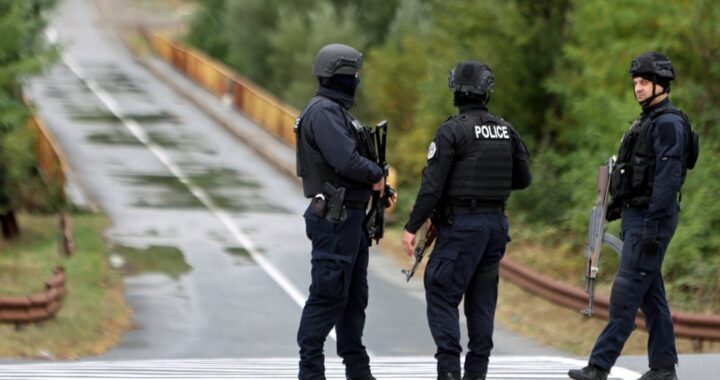

 Armed Kosovo police officers control the road near the village of Banjska, Kosovo, 25 September 2023. Photo: EPA/DJORDJE SAVIC
Armed Kosovo police officers control the road near the village of Banjska, Kosovo, 25 September 2023. Photo: EPA/DJORDJE SAVIC
The proposed resolution by the opposition party, PDK, in Kosovo, requesting financial support for the Kosovo Police, encountered a boycott by the ruling Vetëvendosje party. The ruling party is currently seeking votes for the approval of international agreements valued at over 300 million euros, leading to tensions and deadlock in the Kosovo Parliament.
The resolution for financial support for the Kosovo Police, initially introduced by the Democratic Party of Kosovo, PDK, on October 5th, was boycotted on two occasions, namely October 12 and 19, by the ruling Vetëvendosje, VV, party in the Kosovo Assembly. It has, however, gained support from other opposition parties, including LDK and AAK.
Abelard Tahiri, the Chief of the Parliamentary Group of the PDK, emphasized the importance of supporting the Kosovo Police, especially following the terrorist attack on September 24th by a group of Serbs in the village of Banjska, in the Zveçan municipality, which resulted in the death of police officer Afrim Bunjaku. In the subsequent clashes at the village’s monastery, three Serb attackers were killed.
Through this resolution, PDK called for the allocation of funds for police safety equipment within 15 days of its approval. Additionally, they seeked the approval of a draft law for the early retirement of police officials within 60 days and the coverage of health insurance payments for police officers, starting on January 1, 2024.
PDK MP Rashit Qalaj declared on Thursday that it is unfair not to vote for this resolution in support of the Kosovo Police.
“Police officers were denied an increase in the risk allowance they have always received in the past. This is an unfair decision that affects their well-being and motivation to work. The total annual amount of allowances that the police received previously was 16 million euros,” Qalaj stated during the plenary session on Thursday.
Meanwhile, the government is struggling to approve various international agreements worth over 300 million euros, encompassing projects ranging from infrastructure to investments in renewable energy, due to the lack of support from the opposition.
Abelard Tahiri, the leader of the Parliamentary Group of PDK, has stated that the party’s stance is not to vote for any projects, suggesting that this legislative term should end, followed by the scheduling of new elections.
“We invite you to sit down and discuss the election date, and as soon as we agree to dissolve this non-functional parliament, on that day, we will pass all international agreements,” Tahiri stated.
On the other hand, Arben Gashi, the leader of the Parliamentary Group of the Democratic League of Kosovo, LDK, emphasized that it is the government’s duty to create political consensus in the Assembly for issues considered of national interest or beyond the government’s interests. LDK expresses its readiness to vote for international agreements, except for the credit agreement for public finance and economic growth between the Republic of Kosovo and the International Development Fund.
In response to these developments, Prime Minister Albin Kurti, during a plenary session of the Assembly on October 6th, declared that he will not answer MPs’ questions until international agreements are voted upon.
Opposition deputies regarded Kurti’s statement as government pressure and blackmail.
The resolution for police support was also on the agenda for the October 12th plenary session but failed due to a lack of quorum.
VV MP, Mefail Bajqinovci, declared that their amendments would be executed retroactively.
“It is essential that, for the first time, we have a balanced approach. When we talk about early retirement, the government has formed a team that is working on pension reform, and you will soon see the results. The amendments will be executed retroactively for all those concerned,” he stated.
In October 2023, the Supreme Court issued a legal opinion regarding the daily allowance, salary increases for educational qualifications, and retirement benefits.
The legal opinion of the Supreme Court states that police personnel are entitled to receive a monthly salary equivalent to their regular monthly salary at the end of the year for the years 2018, 2019, 2020, and 2021. Furthermore, according to this document, police personnel have the right to receive salary increases for their educational qualifications for the years 2018, 2019, 2020, 2021, and 2022.
In Kosovo, the salaries of police officers range from 210 euros per month for police cadets to over 1,500 euros per month for the General Director.
20 October 2023 - 18:04

MPs in both Kosovo and Albania on Thursday adopted declarations in sup...

Kosovo MPs elected Albulena Haxhiu of Vetëvendosje as speaker, openin...

A claim that Kosovo Police assaulted a young man at a checkpoint in No...

Kosovo police held 109 suspects as part of a major operation in Prizre...